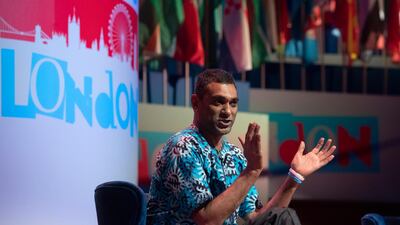Kumi Naidoo, the Secretary General of Amnesty International, has criticised the older generation for not doing enough to tackle the effects of climate change.
Speaking at the One Young World Summit in London on Wednesday, Mr Naidoo said young people were the only group to have acted on climate change with “the right kind of urgency and message”.
“And today, sadly, our young people are behaving like adults and our adult leaders are behaving like children,” he said.
Mr Naidoo said that his generation was “running out of fresh ideas” when it came to addressing the climate crisis.
He urged young people to ignore the phrase "young people are the leaders of tomorrow".
“If you wait for tomorrow, there's not going to be a tomorrow,” Mr Naidoo said.
But he was optimistic that climate activism was making a difference and praised youth movements such as the Fridays for Future movement, led by Swedish activist Greta Thunberg, 16.
Amnesty International has been defending the right of young people to speak out against climate change, as well as pushing for stronger human rights standards on climate change.
Mr Naido said those who were feeling the worst effects of climate change tended to be in poorer parts of the world, such as small island states like the Maldives or the coast of Bangladesh, rather than large contributors to the crisis.
But he said that the crisis would also affect richer countries.
Mr Naidoo gave the example of Hurricane Maria that hit Puerto Rico in 2017 and killed over 3,000 people, more than the number of people who died in the September 11 terrorist attacks in New York.
“Donald Trump might not know that Puerto Rico is part of America, but it is,” he said.
Although deniers of climate change say there have always been natural disasters, the frequency and intensity of these disasters have increased, Mr Naidoo said.
“Humanity has a simple choice right now," he said.
"We can turn our back of the centuries of divisions that we've had between the north, south, east, west, the developed and the developing, and recognise that we either come together now and act as a united family and secure the future of the majority of our children and their children, or we continue to drag our feet like we’re doing right now.
“The end result is people in poor countries will suffer most first but people in rich countries will not be immune.
"We have to say to our leaders, 'Stop playing political poker with the future of our planet and the future of our children', because that is what they're doing right now.”

